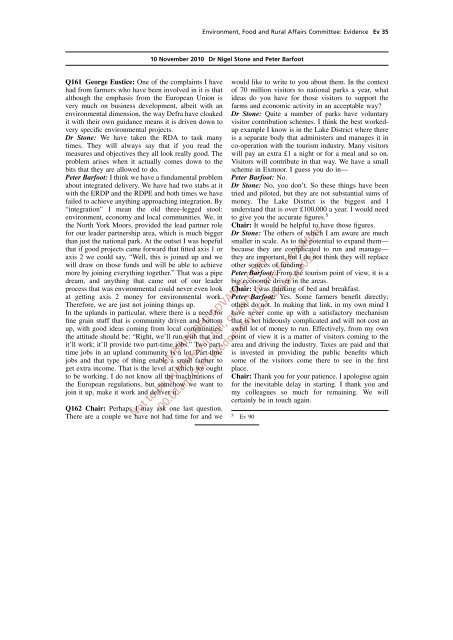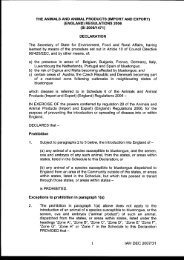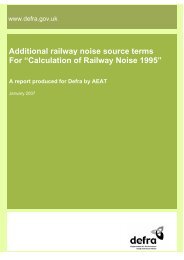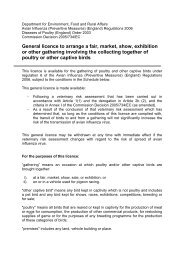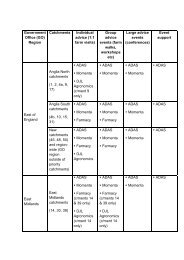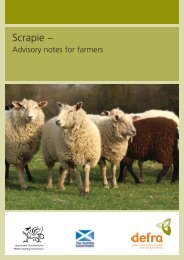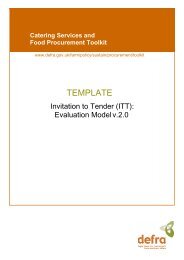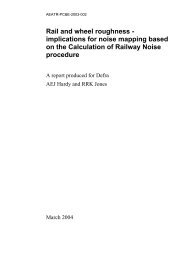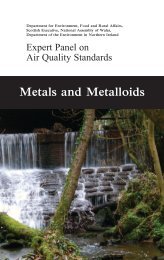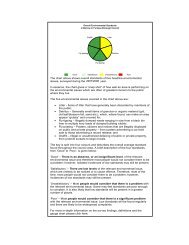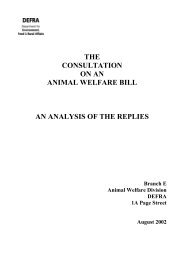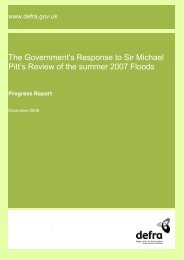Farming in the Uplands - ARCHIVE: Defra
Farming in the Uplands - ARCHIVE: Defra
Farming in the Uplands - ARCHIVE: Defra
Create successful ePaper yourself
Turn your PDF publications into a flip-book with our unique Google optimized e-Paper software.
Q161 George Eustice: One of <strong>the</strong> compla<strong>in</strong>ts I have<br />
had from farmers who have been <strong>in</strong>volved <strong>in</strong> it is that<br />
although <strong>the</strong> emphasis from <strong>the</strong> European Union is<br />
very much on bus<strong>in</strong>ess development, albeit with an<br />
environmental dimension, <strong>the</strong> way <strong>Defra</strong> have cloaked<br />
it with <strong>the</strong>ir own guidance means it is driven down to<br />
very specific environmental projects.<br />
Dr Stone: We have taken <strong>the</strong> RDA to task many<br />
times. They will always say that if you read <strong>the</strong><br />
measures and objectives <strong>the</strong>y all look really good. The<br />
problem arises when it actually comes down to <strong>the</strong><br />
bits that <strong>the</strong>y are allowed to do.<br />
Peter Barfoot: I th<strong>in</strong>k we have a fundamental problem<br />
about <strong>in</strong>tegrated delivery. We have had two stabs at it<br />
with <strong>the</strong> ERDP and <strong>the</strong> RDPE and both times we have<br />
failed to achieve anyth<strong>in</strong>g approach<strong>in</strong>g <strong>in</strong>tegration. By<br />
“<strong>in</strong>tegration” I mean <strong>the</strong> old three-legged stool:<br />
environment, economy and local communities. We, <strong>in</strong><br />
<strong>the</strong> North York Moors, provided <strong>the</strong> lead partner role<br />
for our leader partnership area, which is much bigger<br />
than just <strong>the</strong> national park. At <strong>the</strong> outset I was hopeful<br />
that if good projects came forward that fitted axis 1 or<br />
axis 2 we could say, “Well, this is jo<strong>in</strong>ed up and we<br />
will draw on those funds and will be able to achieve<br />
more by jo<strong>in</strong><strong>in</strong>g everyth<strong>in</strong>g toge<strong>the</strong>r.” That was a pipe<br />
dream, and anyth<strong>in</strong>g that came out of our leader<br />
process that was environmental could never even look<br />
at gett<strong>in</strong>g axis 2 money for environmental work.<br />
Therefore, we are just not jo<strong>in</strong><strong>in</strong>g th<strong>in</strong>gs up.<br />
In <strong>the</strong> uplands <strong>in</strong> particular, where <strong>the</strong>re is a need for<br />
f<strong>in</strong>e gra<strong>in</strong> stuff that is community driven and bottom<br />
up, with good ideas com<strong>in</strong>g from local communities,<br />
<strong>the</strong> attitude should be: “Right, we’ll run with that and<br />
it’ll work; it’ll provide two part-time jobs.” Two parttime<br />
jobs <strong>in</strong> an upland community is a lot. Part-time<br />
jobs and that type of th<strong>in</strong>g enable a small farmer to<br />
get extra <strong>in</strong>come. That is <strong>the</strong> level at which we ought<br />
to be work<strong>in</strong>g. I do not know all <strong>the</strong> mach<strong>in</strong>ations of<br />
<strong>the</strong> European regulations, but somehow we want to<br />
jo<strong>in</strong> it up, make it work and deliver it.<br />
Q162 Chair: Perhaps I may ask one last question.<br />
There are a couple we have not had time for and we<br />
Environment, Food and Rural Affairs Committee: Evidence Ev 35<br />
10 November 2010 Dr Nigel Stone and Peter Barfoot<br />
would like to write to you about <strong>the</strong>m. In <strong>the</strong> context<br />
of 70 million visitors to national parks a year, what<br />
ideas do you have for those visitors to support <strong>the</strong><br />
farms and economic activity <strong>in</strong> an acceptable way?<br />
Dr Stone: Quite a number of parks have voluntary<br />
visitor contribution schemes. I th<strong>in</strong>k <strong>the</strong> best workedup<br />
example I know is <strong>in</strong> <strong>the</strong> Lake District where <strong>the</strong>re<br />
is a separate body that adm<strong>in</strong>isters and manages it <strong>in</strong><br />
co-operation with <strong>the</strong> tourism <strong>in</strong>dustry. Many visitors<br />
will pay an extra £1 a night or for a meal and so on.<br />
Visitors will contribute <strong>in</strong> that way. We have a small<br />
scheme <strong>in</strong> Exmoor. I guess you do <strong>in</strong>—<br />
Peter Barfoot: No.<br />
Dr Stone: No, you don’t. So <strong>the</strong>se th<strong>in</strong>gs have been<br />
tried and piloted, but <strong>the</strong>y are not substantial sums of<br />
money. The Lake District is <strong>the</strong> biggest and I<br />
understand that is over £100,000 a year. I would need<br />
to give you <strong>the</strong> accurate figures. 5<br />
Chair: It would be helpful to have those figures.<br />
Dr Stone: The o<strong>the</strong>rs of which I am aware are much<br />
smaller <strong>in</strong> scale. As to <strong>the</strong> potential to expand <strong>the</strong>m—<br />
because <strong>the</strong>y are complicated to run and manage—<br />
<strong>the</strong>y are important, but I do not th<strong>in</strong>k <strong>the</strong>y will replace<br />
o<strong>the</strong>r sources of fund<strong>in</strong>g.<br />
Peter Barfoot: From <strong>the</strong> tourism po<strong>in</strong>t of view, it is a<br />
big economic driver <strong>in</strong> <strong>the</strong> areas.<br />
Chair: I was th<strong>in</strong>k<strong>in</strong>g of bed and breakfast.<br />
Peter Barfoot: Yes. Some farmers benefit directly;<br />
o<strong>the</strong>rs do not. In mak<strong>in</strong>g that l<strong>in</strong>k, <strong>in</strong> my own m<strong>in</strong>d I<br />
have never come up with a satisfactory mechanism<br />
that is not hideously complicated and will not cost an<br />
awful lot of money to run. Effectively, from my own<br />
po<strong>in</strong>t of view it is a matter of visitors com<strong>in</strong>g to <strong>the</strong><br />
area and driv<strong>in</strong>g <strong>the</strong> <strong>in</strong>dustry. Taxes are paid and that<br />
is <strong>in</strong>vested <strong>in</strong> provid<strong>in</strong>g <strong>the</strong> public benefits which<br />
some of <strong>the</strong> visitors come <strong>the</strong>re to see <strong>in</strong> <strong>the</strong> first<br />
place.<br />
Chair: Thank you for your patience. I apologise aga<strong>in</strong><br />
for <strong>the</strong> <strong>in</strong>evitable delay <strong>in</strong> start<strong>in</strong>g. I thank you and<br />
my colleagues so much for rema<strong>in</strong><strong>in</strong>g. We will<br />
certa<strong>in</strong>ly be <strong>in</strong> touch aga<strong>in</strong>.<br />
EMBARGOED ADVANCE COPY:<br />
Not to be published <strong>in</strong> full, or part, <strong>in</strong> any form before<br />
00.01am GMT Wednesday 16 February 2011<br />
5 Ev 90


